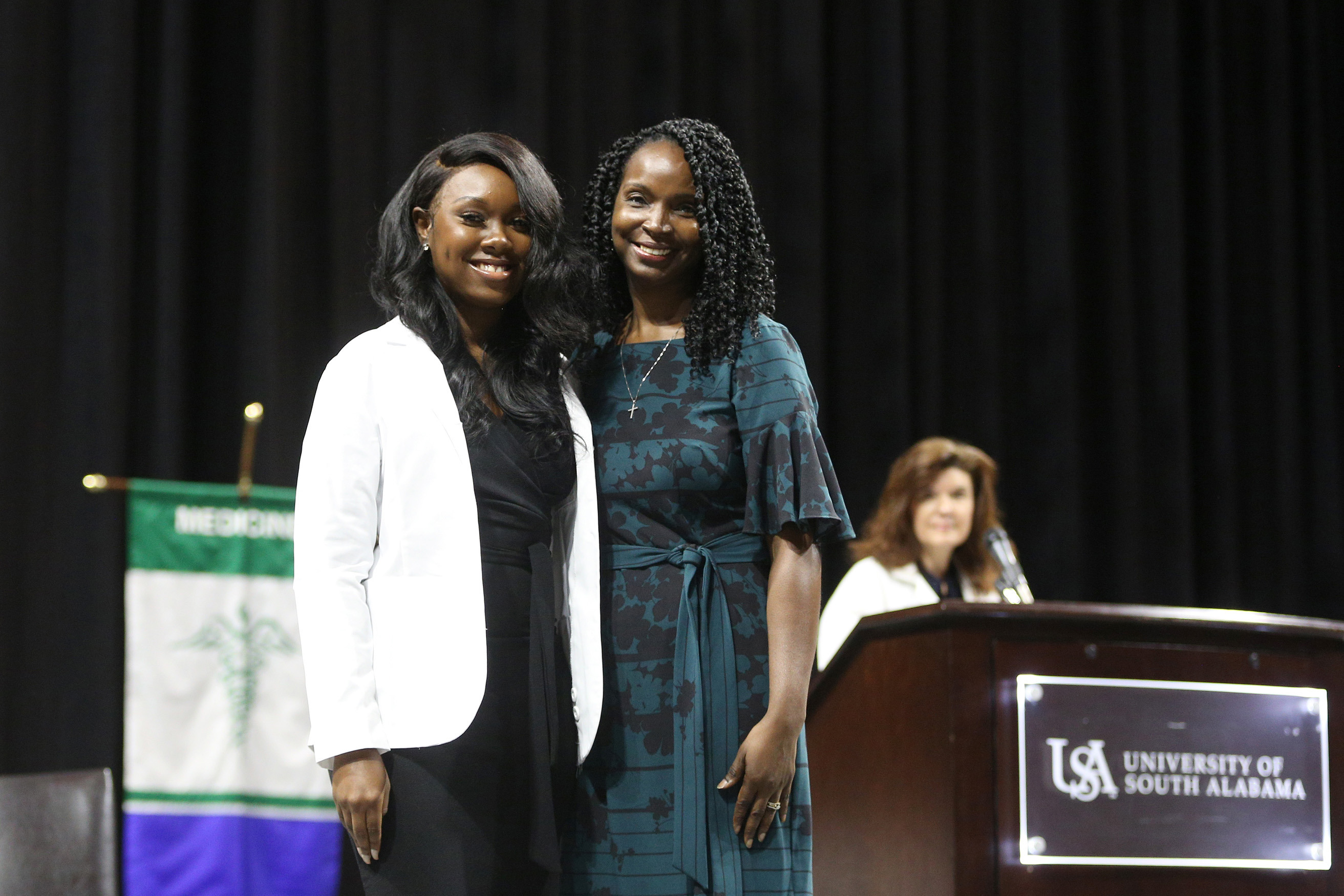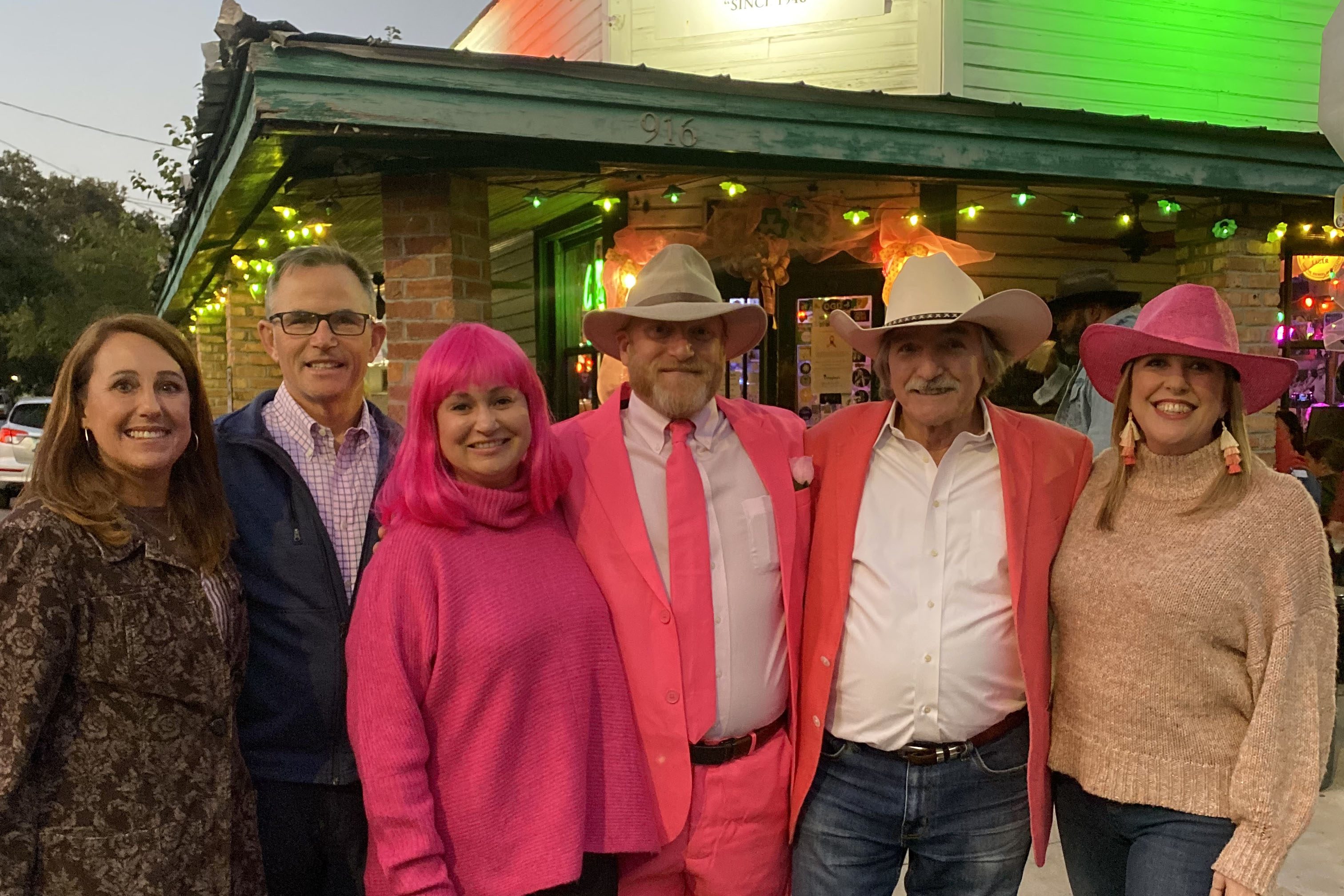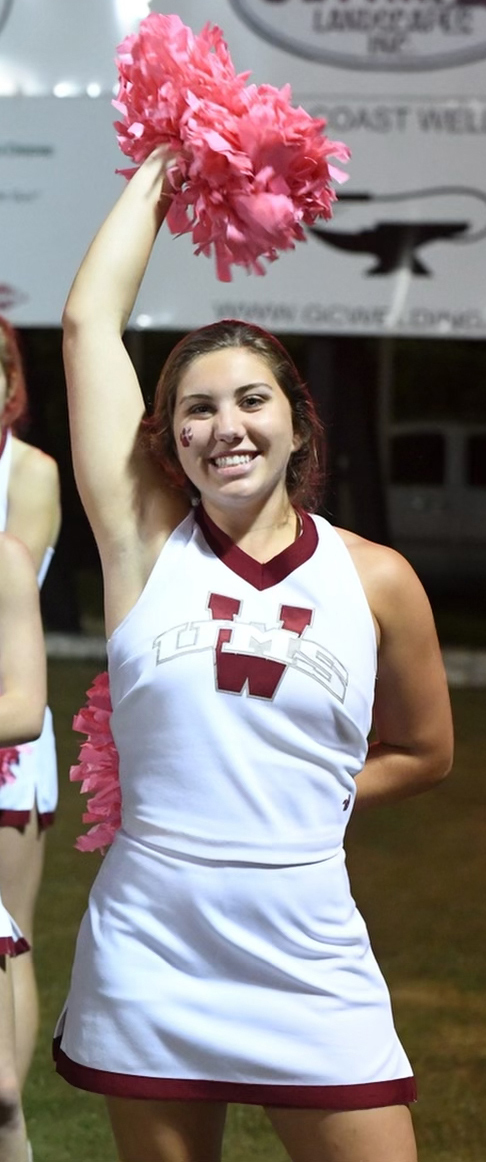
Impacting Health Together
Read how donors to USA Health have supported our three-part mission of education, research and patient care.
Give to USA HealthImpacting Health Together: 2022 Giving Report
We invite you to look through our Report on Philanthropy for fiscal
year 2022. It highlights a few of the many ways that, thanks to your
support, USA Health is helping people lead longer, better lives.
Dr. Ernest DeBakey knew healthcare should be for everyone

When minutes count in a life or death situation, rural communities face tremendous hurdles in the race for life-saving care. Rural patients sometimes must travel hundreds of miles to get emergency or even routine healthcare. This nationwide problem is often caused by lack of physicians, hospitals or clinics in their area. And one local charitable foundation is partnering with the Frederick P. Whiddon College of Medicine at the University of South Alabama to solve the problem in rural areas across Alabama.
Decades ago, Dr. Ernest DeBakey recognized that healthcare should be for everyone, no matter where they live. The challenge? Finding physicians who want to live and work in small towns. So he set out to increase the supply of practitioners in these areas.
Dr. DeBakey was a beloved fixture in the Mobile area medical community. As a surgeon, he served his patients for over 60 years. He and his wife Marsha, a nurse, both saw the urgency for healthcare needs to be met immediately, not after an hour’s drive to the nearest large town or city. Dr. and Mrs. DeBakey both have passed away (2006 and 2019, respectively), but their legacy lives on through the Ernest G. DeBakey Charitable Foundation. The foundation advances medical research, education, and the general health needs of the community.
In 2007, the Ernest G. DeBakey Charitable Foundation created a scholarship for Whiddon College of Medicine students. Any and all first-year medical students are invited to apply in the fall of their first semester. But there's one major requirement: Scholarship recipients must practice medicine in a rural community for five years after completing residency. Their reward is significant—graduating debt-free from medical school.
The foundation now is run by Executive Director Nicole Massingill, who knew and loved the DeBakeys. Massingill said, “Marsha and Dr. DeBakey were a great team. They had the same vision and goals. Once he passed away, it was up to her to continue his work. Marsha was always willing to give, give, give—and that’s what this foundation is about.” After Dr. DeBakey’s death, Marsha worked tirelessly to make sure his vision for healthcare became reality. Massingill believes that in 20 years, we’ll be able to see the continued impact that these rural physicians have made on the state of Alabama.
The current cost of four years at the Whiddon College of Medicine is about $250,000. The debt many students must take-on is staggering, and the opportunity to avoid it is appealing. For students already hoping to practice in a rural area, the DeBakey Foundation scholarship is a perfect fit. In fact, the ideal DeBakey Foundation scholar is one who stays in that rural community, even after completing five years of service. The scholarship targets students who have ties to rural Alabama, since research shows these students are more likely to practice medicine in rural settings.
A graduate of Tuskegee University, Kiara Carmichael from the College of Medicine's Class of 2023 is one such student. Carmichael said, “I began medical school knowing that I wanted to pursue rural medicine, so I was very excited to learn about the DeBakey Foundation scholarship. The DeBakey Foundation scholarship has been a huge financial help to me during medical school.”
Carmichael didn't grow up in a rural area, but her four years at college in Tuskegee were eye-opening for her. Resources were very limited in the rural county, 40 miles east of Montgomery. Because of that stark reality, she realized she had taken healthcare access for granted. Her college experience was the spark that set her on her current path. Carmichael said, “I became interested in learning about the social determinants of health and their effect on Tuskegee’s residents. My time in Tuskegee ultimately led me to want to pursue rural medicine."
Following graduation next spring, Carmichael plans to join a family medicine residency program. After that, she sees herself practicing full-scope family medicine and obstetrics in rural Alabama. “I hope that I can help make healthcare more accessible for areas of need,” she said. She is full of gratitude and realizes this scholarship's impact on her career’s trajectory. “This scholarship has meant so much to me and has helped me tremendously throughout my journey.”
Carmichael is the type of DeBakey Scholar that Dr. and Mrs. DeBakey would have been proud to know. Indeed, their legacy lives on through bright and determined future physicians like Kiara.
Norville Harrison gives back through Pink is the New Green

Norville Harrison has found purpose in loss—and has managed to turn it into a party. His late wife would be so proud.
Debbie, Harrison’s late wife, is the reason he pours himself into his annual fundraiser, Pink is the New Green Soiree. Debbie fought a fierce battle against stage IV breast cancer in 2013, leaving behind a devoted husband and two sons.
Pink is the New Green Soiree has turned into an annual party at Callaghan’s Irish Social Club, with people spilling out into the streets, block-party style. Full of funky music, plenty of beverages, a silent auction, and a good time, it’s no wonder that each year is even better than the last. The event is going on its ninth year. According to Harrison, the event has raised nearly $35,000 over the years, and he has ambitious plans to hit $10,000 in a single night at this year’s event.
Harrison donates the proceeds to the Mitchell Cancer Institute’s Audrey Joyce Grodnick Breast Cancer Research Fund, making sure that incremental steps are made towards a world without breast cancer. “It’s important to me that the money goes towards Mitchell Cancer Institute’s research programs because the money stays here in our community. It’s not going to administrative costs or someone’s salary like it might at a national organization.”
Dr. Seema Singh’s research lab has benefited from Pink is the New Green Soiree. As a professor of oncologic science and the head of the Inflammation and Immunobiology Laboratory at the Mitchell Cancer Institute, she and her lab team have been delving into the role of differential tumor microenvironment in breast cancer racial disparity. She explores how socioeconomic difficulties affect human biology, leading to higher risks for cancer. Her project is aided by an NIH grant and the support of philanthropic funding.
Harrison appreciates the irony of a loud and raucous party to raise money for a cause that affected his beloved wife of 28 years. Debbie was “low-key” and the steady comfort of their family. Meanwhile, Norville never needed much convincing to paint the town red. They brought out the best in the other, each always rising to the occasion. “I think she’d be happy about it,” he says of the event, “She doesn’t have any problems up there in heaven.”
Pink is the New Green Soiree is meaningful because it shows the collective impact of people banding together for a needed cause. Harrison says, “There are 25-30 people who show up every year because they knew and loved my wife. The rest [of the party] keep showing up because it’s a cause worth getting behind.” Callaghan’s, a generous host of the annual event, brings together all types of people—some are able to give $5, others might be able to give 20 times that.
Even after last year’s event, the first since the start of the pandemic, Harrison is surprised at the people that keep showing up—and keep giving—even after a hard year. The final count of donations at the end of the night keeps him hungry for the next one. He knows how important the event, a fundraiser and a community awareness event in one, are to the Gulf Coast cancer-fighting community.
Harrison has learned a lot about the goodness of people along the way. He became Debbie’s full-time caregiver as she went through treatment, and he was humbled by the generosity of friends who helped them along in those long days. His sage words of wisdom to someone going through the dark times of a cancer diagnosis? “Don't be too proud to accept any help you’re offered. It does get hard, even from the caregiving standpoint. But I’d do it all over again. To be there, to do whatever she needed to get well.”
The Harrigans give back to show their gratitude

The first few weeks of Virginia Ann Harrigan’s life were dramatic, to say the least. Her parents, Michelle and Patrick Harrigan, were floored to learn that their daughter had two heart defects at birth. She had a small hole in her heart, as well as a tight spot in the major artery that carries oxygenated blood to the rest of the body. A routine pregnancy hadn’t prepared them for the potentially catastrophic unknown.
The physicians at the Mobile-area hospital where Michelle delivered quickly realized that Virginia Ann needed specialized pediatric care. And they knew that level of care could only be provided at USA Health Children’s & Women’s Hospital. So Virginia Ann was whisked away in the neonatal transport vehicle, a miniature Neonatal Intensive Care Unit on wheels, as her parents tried to make sense of what was happening.
Throughout those first scary days, Michelle counted her blessings and the timing that saved her baby’s life. Sprinkled in with the anxiety were little “God winks” that let the Harrigans know that they were taken care of. Being in the timber business, Patrick’s family had been enthusiastic supporters of Log-a-Load, an organization started by the Alabama Forestry Association. Log-a-Load raises money for children’s health through treatment, education and research at Children’s Miracle Network hospitals. As it pulled away, Patrick and Michelle saw that Virginia Ann’s transport vehicle had a Log-a-Load logo on it. They knew the life-saving vehicle was purchased because of Log-a-Load fundraising, and they knew they were exactly where they needed to be.
As Michelle tells her story, it’s evident that those early days are deeply ingrained in her memory—the feelings of fear, disbelief, uncertainty and gratitude all melded together. After some time in the Children’s & Women’s Hospital NICU on a ventilator, 10-day-old Virginia Ann underwent heart surgery in Atlanta. She then returned home to south Alabama to be a life-long patient of Dr. Lynn Batten, the current Director of Pediatric Cardiology at USA Health.
Dr. Batten has played a major role in the Harrigan family’s life. Virginia Ann, now 19, saw Dr. Batten at regular intervals to check on the heart that caused her parents so much worry nearly two decades ago. Dr. Batten, who first caught Virginia Ann’s heart problems, quite literally saved her life. Michelle is effusive in her praise for Dr. Batten, saying, “She always made us feel like we were doing the right thing. We never felt like we needed to travel for the best care because we had that exceptional care right here, close to home.”
That feeling of appreciation is mutual. Dr. Batten said, “I'm blown away that I get to participate in patients like VA's lives and when I hear feedback like this from families, it really makes me remember that this is why I went into medicine in the first place.”
Dr. Batten has been a coach and cheerleader for the Harrigans through the years, reassuring them that Virginia Ann could live a big and full life. But Michelle and Patrick were told that the true test would be in the teenage years, when Virginia Ann became more active. And she certainly put her heart to the test as she poured herself into dance, swimming, cheerleading, tennis, soccer, and even a triathlon. Michelle said, “We had such good care. We fully trusted our physician and had no reason to think Virginia Ann would break. We never let her special heart become a ‘thing.’ Dr. Batten hammered that home.”
Through all her extracurricular activities, Virginia Ann still found time to excel in her high-level classes. She even picked-up a few volunteer opportunities, including a service trip to Zanzibar in East Africa. And she's always been a mentor to her little sister, Ellie, and all the kids who look up to her, while charming the grown-ups with her mature and delightful personality.
Michelle will never forget the “all-clear” they received from Dr. Batten after Virginia Ann’s routine checkup around 16 years old. “Dr. Batten told us, ‘She can be in the Olympics if she wants to.’” Michelle and Patrick knew then that their girl’s big dreams would become a reality. They were thrilled that her hard work on the playing field and in the classroom would be rewarded as she started thinking forward to college dreams and beyond.
Virginia Ann is now a freshman at Texas Christian University in Fort Worth, Texas. She’s a plane ride, yet a world away from her family—and she loves that she’s getting to spread her wings. Michelle couldn’t be more confident in her daughter’s health or her ability to thrive in her new environment. “We pushed her to her potential because we knew she was the kid who could do it. She’s earned it, and I’m so proud of her.”
To put their gratitude into action, Michelle and Patrick give regularly to support USA Health Children’s & Women’s Hospital. Patrick said, “We realize how life-changing the work done at Children’s & Women’s can be. We’ve experienced it first-hand. And we always want anyone in our community who is going through a similar experience to be able to get top-quality care right here at home.”
Michelle agrees wholeheartedly, “You always say it won’t happen to me, to my family. But you never know when you’ll need that care.”
She sums it up like this: “Giving to Children’s & Women’s Hospital is an investment in our future. It has benefited so many of our friends and their kids. If I can help get something done, I’m all about it. Why in the world would I not?”
Can you see it? Click on the "Reveal" button to reveal what we're seeing at USA Health
